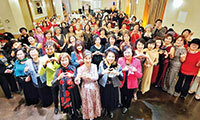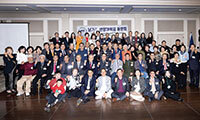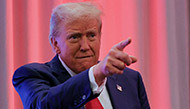
Drayton believes we’re in the middle of a necessary but painful historical transition. For millenniums most people’s lives had a certain pattern. You went to school to learn a trade or a skill — baking, farming or accounting. Then you could go into the work force and make a good living repeating the same skill over the course of your career.
But these days machines can do pretty much anything that’s repetitive. The new world requires a different sort of person. Drayton calls this new sort of person a changemaker.
Changemakers are people who can see the patterns around them, identify the problems in any situation, figure out ways to solve the problem, organize fluid teams, lead collective action and then continually adapt as situations change.
For example, Ashoka fellow Andrés Gallardo is a Mexican who lived in a high crime neighborhood. He created an app, called Haus, that allows people to network with their neighbors. The app has a panic button that alerts everybody in the neighborhood when a crime is happening. It allows neighbors to organize, chat, share crime statistics and work together.
To form and lead this community of communities, Gallardo had to possess what Drayton calls “cognitive empathy-based living for the good of all.” Cognitive empathy is the ability to perceive how people are feeling in evolving circumstances. “For the good of all” is the capacity to build teams.
It doesn’t matter if you are working in the cafeteria or the inspection line of a plant, companies will now only hire people who can see problems and organize responses.
Millions of people already live with this mind-set. But a lot of people still inhabit the world of following rules and repetitive skills. They hear society telling them: “We don’t need you. We don’t need your kids, either.” Of course, those people go into reactionary mode and strike back.
The central challenge of our time, Drayton says, is to make everyone a changemaker. To do that you start young. Your kid is 12. She tells you about some problem — the other kids at school are systematically mean to special-needs students. This is a big moment. You pause what you are doing and ask her if there’s anything she thinks she can do to solve the problem, not just for this kid but for the next time it happens, too.
Very few kids take action to solve the first problem they see, but eventually they come back having conceived and owning an idea. They organize their friends and do something. The adult job now is to get out of the way. Put the kids in charge.
Once a kid has had an idea, built a team and changed her world, she’s a changemaker. She has the power. She’ll go on to organize more teams. She will always be needed.
Drayton asks parents: “Does your daughter know that she is a changemaker? Is she practicing changemaking?” He tells them: “If you can’t answer ‘yes’ to these questions, you have urgent work to do.”
In an earlier era, he says, society realized it needed universal literacy. Today, schools have to develop the curriculums and assessments to make the changemaking mentality universal. They have to understand this is their criteria for success.
Ashoka has studied social movements to find out how this kind of mental shift can be promoted. It turns out that successful movements take similar steps.
First, they gather a group of powerful and hungry co-leading organizations. (Ashoka is working with Arizona State and George Mason University.) Second, the group is opened to everybody. (You never know who is going to come up with the crucial idea.) Third, the movement creates soap operas with daily episodes. (The civil rights movement created televised dramas with good guys and bad guys, like the march from Selma.)
I wonder if everybody wants to be a changemaker in the Drayton mold. I wonder about any social vision that isn’t fundamentally political. You can have a nation filled with local changemakers, but if the government is rotten their work comes to little. The social sector has never fully grappled with the permanent presence of sin.
But Drayton’s genius is his capacity to identify new social categories. Since he invented the social entrepreneur category 36 years ago, hundreds of thousands of people have said, “Yes, that’s what I want to be.” The changemaker is an expansion of that social type.
Social transformation flows from personal transformation. You change the world when you hold up a new and more attractive way to live. And Drayton wants to make universal a quality many people don’t even see: agency.
Millions of people don’t feel that they can take control of their own lives. If we could give everyone the chance to experience an agency moment, to express love and respect in action, the ramifications really would change the world.
<DAVID BROOKS>
스마터리빙
more [ 건강]
[ 건강]이제 혈관 건강도 챙기자!
[현대해운]우리 눈에 보이지 않기 때문에 혈관 건강을 챙기는 것은 결코 쉽지 않은데요. 여러분은 혈관 건강을 유지하기 위해 어떤 노력을 하시나요?
 [ 건강]
[ 건강]내 몸이 건강해지는 과일궁합
 [ 라이프]
[ 라이프]벌레야 물럿거라! 천연 해충제 만들기
 [ 건강]
[ 건강]혈압 낮추는데 좋은 식품
[현대해운]혈관 건강은 주로 노화가 진행되면서 지켜야 할 문제라고 인식되어 왔습니다. 최근 생활 패턴과 식생활의 변화로 혈관의 노화 진행이 빨라지고
사람·사람들
more많이 본 기사
- 전세사기 부부, 미국서 체포·송환 1
- 한인 수중발레 코치 선수 학대혐의 파… 1
- 공항 프리체크 사기 신분도용 피해 주의
- 성탄마켓 차량테러… 200여명 사상
- 토머스 연방대법관, 수백만달러 선물 … 3
- 크루즈에서 만취 난동 30대 남성 제압후 사망
- 잡힐 듯 잡히지 않는 물가…주범은 자… 1
- 이민국 인터뷰시 통역
- “펜타닐보다 3배 강력”… 신종 합성마약 ‘니타젠’ 비상
- CHP 음주단속 강화 성탄연휴 집중단속
- ‘동부전선 이상 있다’ 2
- 가주 인구 늘었다… 신규유입 증가율 3위
- “베이비붐 세대 75%… 자녀에 주택 상속할 것”
- “인간 사이 전염 없지만 방치시 또 다른 팬데믹 우려”
- 클라라, 너무 달라진 얼굴..성형 의혹 심경 고백
- “소셜연금, 가능하면 늦게 받는다”추세 뚜렷
- 아군 전투기 오인 격추…미군,“조종사들 무사”
- 학교 총기난사 15세 소녀 “부모 이혼·양육권 분쟁”
- 김종민, 생방송 중 결혼 발표 “2년 만난 여친, 내년 함께할 예정”[KBS연예대상]
- 바이든 학자금 부채 추가 탕감안 결국 폐기
- 올해 이민자 추방 10년래 최다
- 뉴욕 민화협, 맨하탄 할렘교회에 겨울용품 전달
- 극단적 포퓰리즘 증상 1
- 설국에 갇히다
- 한인연합회, 스티브 리 연임 추대
- 테슬라, 모델3 등 70만대 대규모 리콜
- 20대 고용률 ‘끝모를 추락’…21개월래 최저
- 계속된 수취거절에 헌재 “尹 20일 … 1
- 트럼프 취임 전 마무리… TSMC 독주 속 지원금 줄어
- 구미시장 “이승환 콘서트 대관 취소”… 2
- 임지연 위기 극복 ‘옥씨부인전’ 최고 10.4% 타격 없었다
- 트럼프, 취임 첫날 WHO 탈퇴 검토
- “장학금 수혜자들과 관계 강화”
- 미 이민 고려 중국 기업인들 증가
- 브라질서 버스·트럭 충돌 참사… 최소 38명 사망
- 연방정부 셧다운 ‘아슬아슬’ 모면
- 한양대
- 연방정부 ‘셧다운’ 피했다… 트럼프 요구안은 무시
- 이지혜 “셋째 시험관, 몰래 시도했다” 고백..채정안·이현이 오열 [동상이몽2]
- “크롬 매각 강제 극단적”… 독점해소 방안 제안
- “사기 방지 요령 숙지”… 그래도 걸려드는 사기 피해
- 대통령·국회가 함께 책임지는 헌법이 필요하다
- 尹측, 공수처 2차 출석요구서도 수취… 1
- 리버풀전 완패에 실망한 손흥민 “홈에서 6실점, 고통스러워”
- 저력의 애플… 시총 4조달러 ‘눈앞’
- MLB ‘도루왕’ 리키 헨더슨 별세… 향년 65세
- “동지 팥죽 나눠요”… 연말 훈훈한 인심
- 스타벅스 노조 파업… LA 등 전국 확산
- 거침없는 미 경제…두 분기 연속 3%대 성장
- 이종석, 올해도 훈훈한 선행..서울아산병원에 1억 기부
1/5지식톡

-
 모임
0
모임
0서울 수송 초등학교 동창회 2024년12월 마지막 토요일 송년회 모임 714-975-4979
-
 사업체 거래의 중요성.
1
사업체 거래의 중요성.
1사업체 거래는 그동안 정성과 수고로 이루어낸 사업체를 매각하는또한 바이어의 입장에서는 생업이 되어야하는 중요한 거래입니다.많은 경험과 전문 지식 그리고 신뢰감을 느낄수 있는 전문 부동산 에이젠트와 함께 하시는게 많…
-
 동아리
0
동아리
0쥐띠 모임 동아리607284용띠 모임 동아리 647688원숭이띠 모임 동아리 688092CELL & TEXT 714-975-4979
-
 밴드
0
밴드
0혹시나 해서 글 올려봅니다 ROCK 밴드 에서 MEMBER 찾고있습니다 POSITION :키보드 1st GUITARIST 여성 보컬 색소폰 트럼펫 트롬본 피아노 연주자 음향장비 전문가..기타등등..찾고있습니다 로스…
-
 19년차 젊고 경험 많은 부동산 브…
1
19년차 젊고 경험 많은 부동산 브…
1안녕하세요,19년차 캘리포니아 부동산 브로커 다니엘 장 입니다.▶"HIGH IQ (156 )" 그룹 "US MENSA/멘사"◀ 평생회원 인 다니엘 장이 현재 President / Broker 로운영 중인 미 주류 …
케이타운 1번가
오피니언
 옥세철 논설위원
옥세철 논설위원‘동부전선 이상 있다’
 캐서린 램펠 워싱턴포스트 칼럼니스트 린
캐서린 램펠 워싱턴포스트 칼럼니스트 린 극단적 포퓰리즘 증상
 전지은 수필가
전지은 수필가 설국에 갇히다

감염병 방역과 식품 안전 유의해야

힘들었던 한해 아름다운 마무리를
 민병임 뉴욕지사 논설위원
민병임 뉴욕지사 논설위원[살며, 느끼며] 계엄 이후
 노세희 사회부장
노세희 사회부장 탄핵 정국 속 전세계가 주목한 ‘K-민주주의’

계엄… 알고리즘과 닭 싸움
 박연실 수필가
박연실 수필가 [윌셔에서] 돌아가기에는 너무 멀리
1/3지사별 뉴스

뉴욕 민화협, 맨하탄 할렘교회에 겨울용품 전달
민족화해협력 범국민 뉴욕협의회(이하 ‘뉴욕 민화협’)는 22일 맨하탄 할렘교회를 방문해 모자와 장갑 등 3만달러 상당의 겨울용품 2,000여점…
연방정부 셧다운 ‘아슬아슬’ 모면

“소셜연금, 가능하면 늦게 받는다”추세 뚜렷
미국에서 소셜연금을 늦게 받는 사람들이 늘어나고 있다. 평균 수명이 길어진 것과 함께 요즘 들어 70세까지 일하는 사람들이 늘었기 때문이다. …
한인연합회, 스티브 리 연임 추대

아이들 학업 결실 전시도 함께
새크라멘토 한국학교(교장 천청구)는 지난 14일 오전 11시에 가울학기 종각식을 가졌다.박지윤 교감의 시회로 국민의례 후 서청진 이사장을 대신…
연금 100% 수령 ‘만기 은퇴연령’ 60년생부터 67세로

오늘 하루 이 창 열지 않음 닫기 





















































.png)


댓글 안에 당신의 성숙함도 담아 주세요.
'오늘의 한마디'는 기사에 대하여 자신의 생각을 말하고 남의 생각을 들으며 서로 다양한 의견을 나누는 공간입니다. 그러나 간혹 불건전한 내용을 올리시는 분들이 계셔서 건전한 인터넷문화 정착을 위해 아래와 같은 운영원칙을 적용합니다.
자체 모니터링을 통해 아래에 해당하는 내용이 포함된 댓글이 발견되면 예고없이 삭제 조치를 하겠습니다.
불건전한 댓글을 올리거나, 이름에 비속어 및 상대방의 불쾌감을 주는 단어를 사용, 유명인 또는 특정 일반인을 사칭하는 경우 이용에 대한 차단 제재를 받을 수 있습니다. 차단될 경우, 일주일간 댓글을 달수 없게 됩니다.
명예훼손, 개인정보 유출, 욕설 등 법률에 위반되는 댓글은 관계 법령에 의거 민형사상 처벌을 받을 수 있으니 이용에 주의를 부탁드립니다.
Close
x